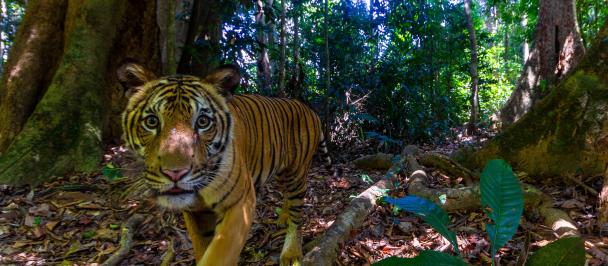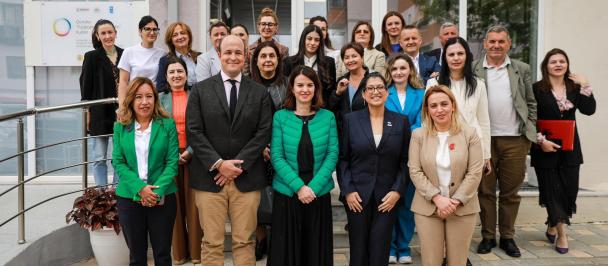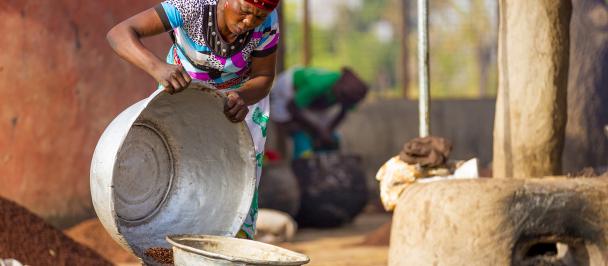7 things you didn’t know about Islamic Finance in Indonesia
September 13, 2022

Did you know that a forest community in Indonesia’s Jambi province can now access green electricity, thanks to the Islamic form of donation called Zakat? Also, how do the Islamic principles of sharia economy unleash much-needed funds in billions of dollars to support sustainable development and address climate crisis?
We recently talked to our Islamic Finance Specialist at UNDP Indonesia, Greget Kalla Buana who unpacks the main characteristics of Islamic finance and highlights its massive potential to accelerate the achievement of the Sustainable Development Goals.
- Not one or two products, Islamic financing offers a diverse and rich financial product.
Indonesia offers Islamic finance strategies that accelerate the growth of Islamic finance, which include ziswaf (zakat, infaq, sadaqa, waqf), microfinance, banking, capital market, insurance, and more. All of these products carry massive opportunities to raise fresh funding in millions of dollars.
- UNDP’s Innovative Financing Lab has played an instrumental role for development Islamic finance products in Indonesia.
UNDP Indonesia established an Innovative Financing Lab as part of efforts to create a collaborative space to develop solutions to SDG finance. The Lab offers a space to test funding models for development initiatives, including Islamic finance.
- Indonesia was the first country in the world to launch a zakat-supported SDG project.
UNDP, National Zakat Authority (BAZNAS), and Bank Jambi work together. BAZNAS and Bank Jambi contributed zakat funds and CSR funds to implement micro hydro power plant projects in Jambi Province. UNDP blended these resources with the Global Environment Facility (GEF) to support renewable energy initiatives, benefitting more than 5000+ beneficiaries or 900+ households.
- Indonesia pioneered the development of Green Sukuk and Green Waqf
UNDP collaborated with the Government of Indonesia on the issuance of the first Green Sukuk to finance climate change mitigation and adaptation. UNDP and the Indonesian Waqf Board (BWI), supported by IPB University, Waqf Centre for Indonesian Development and Studies (WACIDS), and the Green Waqf Movement Team have developed a green waqf framework, which aims to utilize waqf to support climate action in areas with tangible social-environmental impacts.
- Notable Civil Society Organizations (CSOs) tap into Islamic Finance as they work on critical development issues such as poverty reduction.
One of these organizations is Tadamon which is a platform for CSOs and Organization of Islamic Cooperation Member Countries working on poverty reduction.The Tadamon is focused on supporting Civil Society Organizations (CSOs) and local communities working on poverty reduction by connecting their effort through an aggregated crowdfunding platform with 500 CSO in 57 OIC member countries. It works on empowering CSOs on capacity building programs, mobilizing resources and leveraging expertise to eradicate poverty. Indonesia was among the pilot countries, and the first in the Asia Pacific region, to implement the project.
- Indonesia is also home to Centre of Excellence (CoE) in Islamic Finance for Sustainable Development Goals (SDGs)
Established in 2021, the Centre of Excellence (CoE) in Islamic Finance for Sustainable Development Goals (SDGs) is a joint initiative with the intervention of Universitas Islam Internasional Indonesia (UIII), UNDP, and the Islamic Development Bank (IsDB). The Centre focuses on project development assistance, SDGs alignment, and knowledge building.
- Islamic finance plays a critical role in reducing the SDG Gap
Indonesia needs at least USD 4.75 trillion (SDGs Roadmap, 2019) and over USD 300 billion to achieve the SDGs and the climate target (Indonesia's Updated NDC, 2021), by 2030. Islamic finance offers an opportunity to fill the gap. Working with many Islamic financial instruments, such as zakat, waqf, sukuk, microfinance, and takaful/insurance, creates broader economic growth and social welfare opportunities. It is also in line with the Government of Indonesia's priorities, which aim to make the country a major global Islamic finance hub.
Greget Kalla Buana was interviewed by Kamal Najmus Salehin, Communication and Strategic Engagement Specialist, Innovative Financing Lab, UNDP Indonesia

 Locations
Locations


